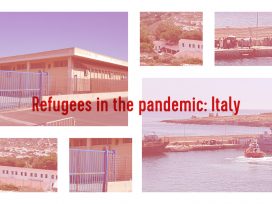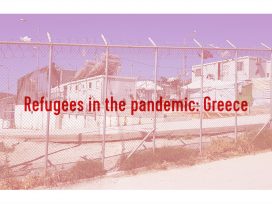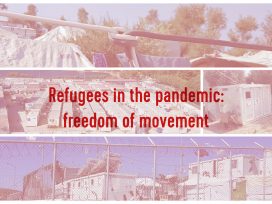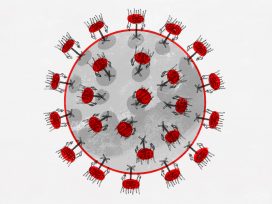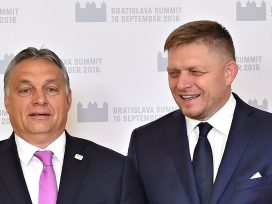The list of signatories to the statement issued by members of the European People’s Party calling for the expulsion of Fidesz, following Hungary’s ‘Coronavirus Protection Act’, contained some notable absences. Realignments on the European right are making the EPP’s lack of unanimity on the question of national populism untenable.
The ‘Hungary question’ has been hanging over the EU ever since the European Parliament voted back in September 2018 to call on the Council to trigger the Article 7 procedure against the country. Suspension of a member state’s voting rights requires unanimity. But because there is currently no chance of that happening, it is the European right that now finds itself under pressure to act.
For the European People’s Party (EPP), the issue is all about respect for liberal democracy and the response to national populism. For Viktor Orbán, the dilemma is whether to continue playing the role of enfant terrible within the EPP, with all the advantages that brings to his country – or to enter a new, less stable grouping with the far-right. Is it better to be a small fish in a big pond or a big fish in a small pond?
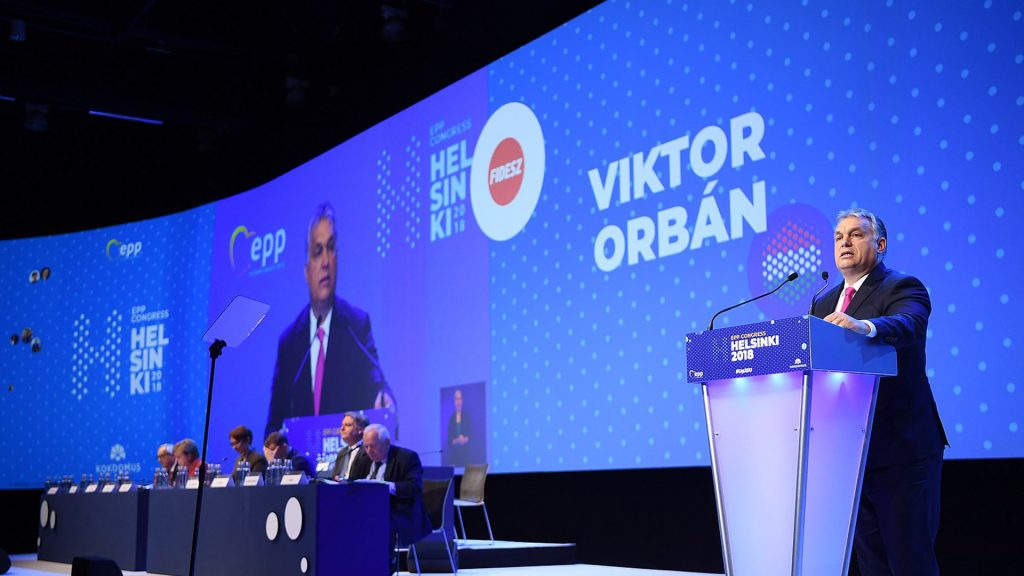
Orbán at the 2018 EPP congress in Helsinki. Photo by European People’s Party from Wikimedia Commons
Divisions
In March 2019, the EPP provisionally suspended Fidesz. Since then, the main players have been attempting to raise the stakes ahead of the next party congress in 2020 and a final vote had been expected on whether to exclude Fidesz altogether. However, at the beginning of February a committee chaired by former European Council President Herman Van Rompuy agreed to postpone the vote once again. Suspend or expel Fidesz: that remains the question for the EPP.
Conflict erupted back in the spring of 2019 at the time of the European election campaign. Fidesz posters featuring Jean-Claude Juncker and George Soros, both grinning broadly, implied that the pair were supporters of the EU policy to open its borders to the huge wave of immigration in 2015/2016. Juncker, the face of the EPP and the outgoing President of the European Commission, responded by announcing that Fidesz ‘no longer has a place within the EPP’. But, at the opening of the European Council summit in December, the Hungarian government spokesman Zoltán Kovács persisted with the same rhetoric, referring to an ideologically driven fight against Hungary organized by Soros. Back we were with the image of the New York-based Jewish banker from Hungary, pulling the strings in Brussels.
Beyond the war of words, there are disagreements over strategy. Orbán blames the moderates for what he sees as the EPP’s loss of momentum. With Angela Merkel advocating multiculturalism and the CDU in favour of gay marriage, it is time, he argues, to re-group around family values, nationhood and Europe’s Christian tradition. Reform of the political right must, he says, be a precursor to reform of Europe itself. By threatening to leave the EPP unless this happens, Orbán is turning the tables on his opponents who wish to see Fidesz expelled.
Coalitions
The EPP has always been a home for a diverse range of political groupings on the centre-right. Orbán has long benefited from this level of pluralism within the party and has never missed an opportunity to remind audiences he was an EPP deputy chair. For most of the past decade, the EPP has protected and indulged him, turning a blind eye (and sometimes two blind eyes) to Budapest’s drift towards authoritarianism.
To understand the present dilemma, we must to look back for a moment. In early 2000, Viktor Orbán, at 35, was the youngest prime minister in Europe, having transformed Fidesz from the liberal party it had been in 1990 into a national conservative party. Austria was at the time experimenting with a new type of coalition between the Christian right (ÖVP) and Jörg Haider’s far-right (FPÖ). In response, Brussels, Paris (Chirac) and Berlin (Schroeder) placed Austria under quarantine. Viktor Orbán was the first opponent of quarantining to hold a joint press conference with the Austrian chancellor Wolfgang Schüssel. Strong links were subsequently formed with the Austrian right and with the CSU in Bavaria. Edmund Stoiber, then head of the CSU, joined forces with Schüssel and Orbán to form a ‘Budapest–Vienna–Munich axis’. The three leaders were united by their criticism of interference by Brussels and their insistence on repeal of the Beneš decrees as a pre-condition of the Czech Republic’s accession to the EU.1 This alliance of Fidesz with the ÖVP and the CSU/CDU lies behind the EPP’s protection of Orbán after he returned to power in 2010.
But the political right in Austria and Germany was not solely to blame. The Barroso Commission also displayed a lax attitude in 2010 and 2011, when Fidesz’s assaults on press freedom and the separation of powers became flagrant. The European Commissioner charged at the time with delivering a few polite words of protest to Orbán was none other than Neelie Kroes, not exactly a stickler when it came to questions of law or ethics.2 Her approach stood in marked contrast to that of her social democratic compatriot Frans Timmermans, who between 2014 and 2019 abandoned the softly-softly approach taken by the previous Commission towards Poland and Hungary. Both countries now faced with Article 7 procedures, where the process itself counts as much as, if not more than, the unlikely sanction. Orbán and the Polish prime minister Jarosław Kaczyński have recently been at pains to emphasise that Commission President Ursula von der Leyen was elected by only a very slim margin and thanks to their support – a reminder that she owes them.
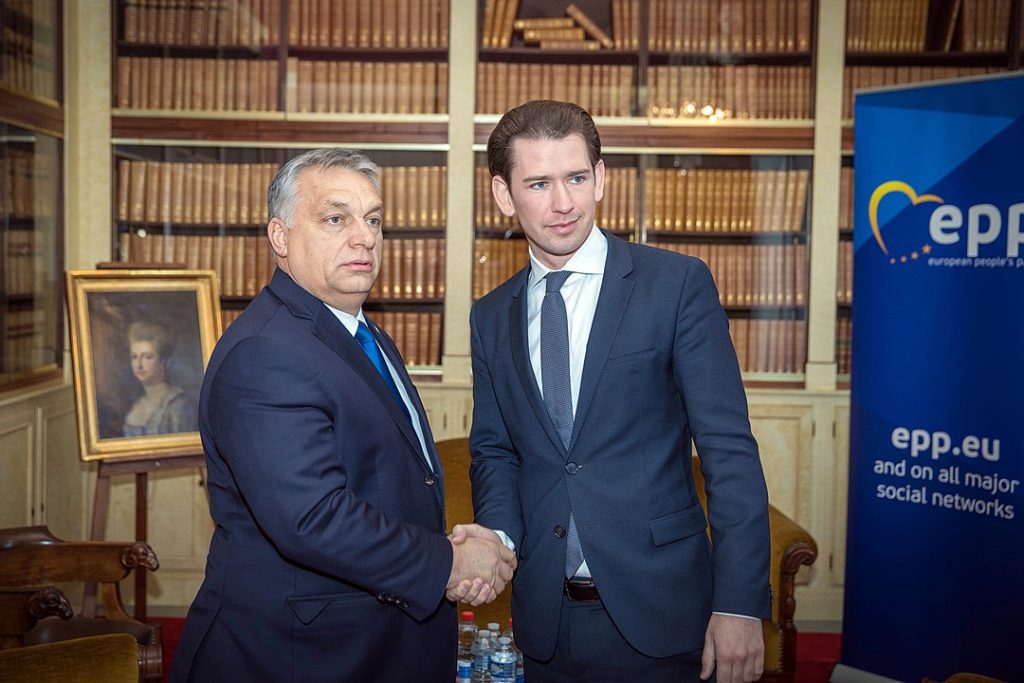
Orbán and Kurz at the 2018 EPP summit in Brussels. Photo by European People’s Party from Wikimedia Commons
Reform?
It is not only the Commission’s attitude that has changed, but also the constellation of the European right. Support for Orbán from the Polish Law and Justice Party (PiS) and the Visegrád Group was famously strengthened by their joint opposition both to Merkel’s open-door policy and the Juncker Commission’s migrant quotas policy during the migrant crisis of 2015/2016. But now it is Italy and Austria, Hungary’s pre-war allies, who are providing Orbán with further options.
In late August 2018, Orbán and Salvini launched an alliance of anti-immigration sovereignists to oppose the progressive liberals led by Macron. The European elections proved inconclusive for this initiative. Austria, meanwhile, is fast becoming a political laboratory for the whole of Europe. With Sebastian Kurz as chancellor and head of the ÖVP, the country sees itself as a bridge between East and West. The Austrian government is fully in step with Orbán and the Visegrád Group on migration, without sharing their Euroscepticism.
The ÖVP has in the last three years experimented with two quite different coalitions. As far as the EPP is concerned, each breaks as many taboos as the other. First there was the alliance with the far-right FPÖ, which came to a spectacular end in May 2019 after the FPÖ leader Heinz-Christian Strache was filmed offering political favours to what he believed was the niece of a Russian oligarch. New elections at the end of 2019 returned the ÖVP to power, now in coalition with the Greens. At a time when both mainstream right and the left are in decline everywhere, this holds some potential for conservative parties in other countries, particularly the CDU in Germany.
Orbán’s ultimate aim had been to unite the hard right under one umbrella, without joining forces with Marine Le Pen, Geert Wilders, Fratelli d’Italia and the other identity extremists in the EU. The partnership with Kaczyński and PiS was reaffirmed in Warsaw in early January. But, after Brexit and the departure of the Tories, it was not the time for Orbán to join the newly-orphaned Conservatives and Reformists. With Salvini also failing to make headway, at least temporarily, the immediate prospect of national populist alliance of the kind envisaged by Orbán seems less credible.
Finally, the end of the Manfred Weber era means that Orbán is set to lose the protection that he has previously enjoyed within the EPP. Donald Tusk, the caretaker president of the EPP, the former Prime Minister of Poland and the outgoing President of the European Council, has embarked on an entirely different course. In a landmark speech at the EPP summit in November 2018, Tusk – a longstanding friend of Viktor Orbán but an implacable opponent of Jaroslaw Kaczyński’s PiS – placed principle above personal allegiance, saying:
Let me be absolutely clear: if you are against the rule of law and independent judiciary, you are not a Christian Democrat. If you don’t like the free press and NGOs, if you tolerate xenophobia, homophobia, nationalism and anti-Semitism, you are not a Christian Democrat. If you place the state and the nation against, or above, the freedom and dignity of the individual, you are not a Christian Democrat. If you wish for conflict and divisions globally and inside the European Union, you are not a Christian Democrat. If you support Putin and attack Ukraine, if you are in favour of the aggressor and against the victim, you are not a Christian Democrat. If you want to replace the western model of liberal democracy with an eastern model of ‘authoritarian democracy’, you are not a Christian Democrat.
Orbán’s response came in the form of a memorandum on the state of the EPP addressed to its executive in February 2020. Rather than the EPP confronting left-liberalism head on, it had become a ‘centrist coalition that was moving away from the Christian right and closer to the left’, having abandoned the fight against communism and Marxism.3 The memorandum went on to say that ‘we have abandoned a model of family based on marriage between a man and a woman and fallen prey to gender politics. In place of policies promoting childbirth and the family, we now look to mass immigration to provide a solution to our demographic problems.’
The consequence, Orbán suggested, would be that the EPP would become increasingly divided along East-West lines. This claim was, however, undermined by Orbán’s criticism of the EPP for electing Donald Tusk as president. The problem is clearly not the difference between East and West, but about where conservative parties in Europe stand ideologically, who they are allied with, and what their red lines are. While Orbán was attending a meeting of the hard-right group of national conservatives in Rome,4 Merkel was reprimanding the Thuringian branch of the CDU for its overtures towards the far-right AfD.
For years, the EPP was seen as a pillar of the European project under Franco-German influence. Now, however, the party is finding that central Europe – with Orbán in Hungary, Kurz in Austria and Tusk from Poland – is forcing it to re-examine its political choices.
Post-script
On 30 March, Hungary adopted a ‘Coronavirus Protection Act’ that gives Viktor Orban’s government the ability to rule by decree for an unlimited period. It does away with remaining checks on Orbán’s power, starting with parliament, where Fidesz holds a two-thirds majority. The former Hungarian minister of justice, Péter Bárándy say that the law means that ‘the National Assembly no longer exists, its functioning is an illusion’. Its provisions allowing sentencing of up to five years for ‘distorting facts’ clearly target what little remains of the independent media.
Orbán has used the current state of emergency to complete his grab on power that has been underway for the past decade. Ten years ago, he used the financial and economic crisis to establish himself as the protector of the people against globalisation and international financial institutions. In 2015, he used the migrant crisis to pose as the defender of the nation, if not Europe as a whole, against the Muslim hordes. Now he is using the Corona epidemic to put democracy on a respirator and move Hungary one notch further towards ‘electoral authoritarianism’.
Orbán clearly assumed that, because other governments were otherwise engaged, he could get away with this latest power-grab without causing too much political damage internationally. In the past, the European response has indeed been belated and often ambivalent. This time, responses were quicker, yet no less cautious.
The day after the law was passed, the Commission president Ursula von der Leyen (EPP) issued a statement warning member-states against weakening fundamental rights and democratic values – without, however, mentioning Hungary specifically. A much stronger and more explicit statement came from the president of the European Parliament, David Sassoli, defending parliamentary democracy and the freedom of the press. A declaration made by thirteen foreign ministers (the number later increased) stated similar concerns, but again, made no explicit reference to Hungary. The initial absence of eastern European signatories from the statement suggests that the V4 and the ‘new member states’ more broadly are reluctant to sanction Orbán, as if concerned that one day the finger may be pointed at them. That Hungary also later signed up to the statement risked making a mockery of the whole exercise.
And finally, there is the response of the EPP. After Manfred Weber, the leader of the group in the European Parliament, failed to show any leadership on the issue, thirteen EPP parties issued a statement on 7 April demanding that Fidesz be expelled – the number grew to fourteen two days later, when Tusk’s own PO joined the list of signatories. However, the CDU/CSU, the ÖVP, the Spanish Partido Popular, Les Républicains in France and Berlusconi’s Forza Italia were notable absences. In other words, the EPP is as divided and undecided as ever over ‘the Hungarian question’ – which suits Viktor Orbán rather well.

This article was published in cooperation with CAIRN International Edition, translated and edited by Cadenza Academic Translations.
The Beneš decrees, which were adopted by the Czechoslovakian government in 1945, nationalised the assets of Germans from the Sudetenland. Many of these Germans had resettled in Bavaria and, throughout the post-war period, made up a powerful lobby in the state and in the CSU. The decrees also applied to Hungarian assets in Slovakia.
Kroes was uncompromising on the subject of ‘free and fair competition’, but less eloquent when it came to the rule of law in Hungary and elsewhere. It has since emerged that, during her time as a commissioner, she was on the boards of a number of offshore companies.
This was an allusion to Jean-Claude Juncker’s participation in an event in Trier in May 2018 commemorating Karl Marx – something that passed off almost unnoticed in the West but provoked a strong reaction in former communist countries.
National Conservatism Conference, Rome, 3–4 February 2020, attended by Viktor Orbán, the PiS ideologue Ryszard Legutko, and Marion Maréchal. Matteo Salvini decided not to take part in order to avoid competing with Giorgia Meloni, president of the (post-)fascist party Fratelli d’Italia.
Published 10 April 2020
Original in French
Translated by
Cadenza Academic Translations
First published by Esprit 4/2020 (French version); Eurozine (English version)
Contributed by Esprit © Jacques Rupnik / Esprit / Eurozine
PDF/PRINTPublished in
In focal points
Newsletter
Subscribe to know what’s worth thinking about.
Related Articles

For a strong start into the second season, we talk about corruption in the EU. In the basement of the European Parliament we talk Italian mafia, Orbán’s son-in-law, and the misuse of public funding in member states with MEPs.
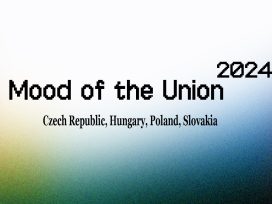
Prefiguring Europe’s future
Czech Republic, Hungary, Poland, Slovakia
Since the war in Ukraine, the Visegrád Four group no longer articulates a common voice in the EU. Even the illiberal alliance between Hungary and Poland has come to an end. Yet in various ways, the region still demonstrates to Europe the consequences of the loss of the political centre.


